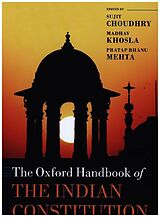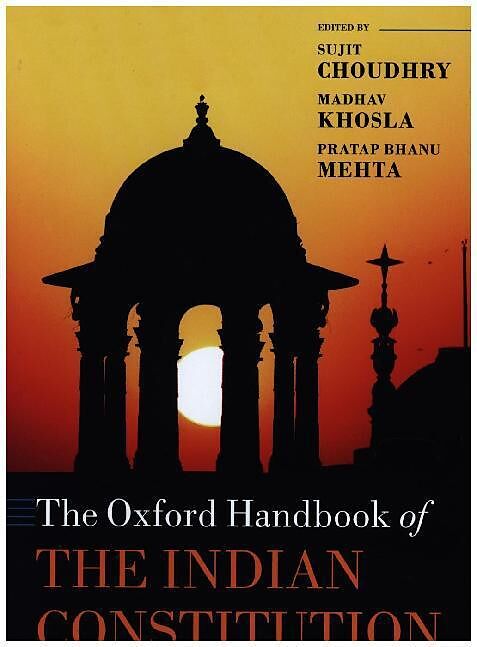The Oxford Handbook of the Indian Constitution
Einband:
Fester Einband
EAN:
9780198704898
Untertitel:
Englisch
Autor:
Sujit (Dean and I. Michael Heyman Profes Choudhry
Herausgeber:
OUP Oxford
Anzahl Seiten:
1116
Erscheinungsdatum:
24.03.2016
ISBN:
978-0-19-870489-8
As the first major post-colonial constitution, the Indian Constitution holds particular importance for the study of constitutional law and constitutions. Providing a thorough historical and political grounding, this Handbook examines key debates and developments in Indian constitutionalism and creates a framework for further study.
Zusatztext The Oxford Handbook of the Indian Constitution is a massive undertaking--not only in the many facets of the Indian Constitution that it explores, but in the detailed and illuminating ways in which it relates the constitutional politics of India to constitutionalism generally in the world. The result is that constitutional scholars everywhere will benefit from reading these fifty-six rich and insightful chapters. I can't imagine a better or more thoughtful guide to the principles, procedures, and problems of the world's largest democracy. Informationen zum Autor Sujit Choudhry is Dean and I. Michael Heyman Professor of Law at the UC Berkeley School of Law. His books include The Migration of Constitutional Ideas (Cambridge, 2006) and Constitutional Design for Divided Societies: Integration or Accommodation (Oxford, 2008). Madhav Khosla is a PhD candidate at the Department of Government, Harvard University. His books include The Indian Constitution (Oxford, 2012), Letters for a Nation: From Jawaharlal Nehru to His Chief Ministers (Penguin, 2014) and Unstable Constitutionalism: Law and Politics in South Asia (with Mark Tushnet, Cambridge, 2015).Pratap Bhanu Mehta is President and Chief Executive of the Centre for Policy Research, New Delhi. His books include The Burden of Democracy (Penguin, 2003), Public Institutions in India: Performance and Design (with Devesh Kapur, Oxford, 2005), and The Oxford Companion to Politics in India (with Niraja Gopal Jayal, Oxford, 2010). Klappentext As the first major post-colonial constitution, the Indian Constitution holds particular importance for the study of constitutional law and constitutions. Providing a thorough historical and political grounding, this Handbook examines key debates and developments in Indian constitutionalism and creates a framework for further study. Zusammenfassung As the first major post-colonial constitution, the Indian Constitution holds particular importance for the study of constitutional law and constitutions. Providing a thorough historical and political grounding, this Handbook examines key debates and developments in Indian constitutionalism and creates a framework for further study. Inhaltsverzeichnis Introduction 1: Sujit Choudhry, Madhav Khosla, and Pratap Bhanu Mehta: Locating Indian Constitutionalism Part I: History 2: Rohit De: Constitutional Antecedents 3: Uday S. Mehta: Indian Constitutionalism: Crisis, Unity, and History 4: Hanna Lerner: The Indian Founding: A Comparative Perspective Part II: Negotiating Constitutionalism 5: Chintan Chandrachud: Constitutional Interpretation 6: Upendra Baxi: Law, Politics, and Constitutional Hegemony: The Supreme Court, Jurisprudence, and Demosprudence 7: Gary Jacobsohn: Constitutional Identity 8: Shruti Rajagopalan: Constitutional Change: A Public Choice Analysis 9: Lavanya Rajamani: International Law and the Constitutional Schema Part III: Constituting Democracy 10: Niraja Gopal Jayal: Citizenship 11: Sujit Choudhry: Language 12: Aditya Sondhi: Elections 13: Rahul Sagar: Emergency Powers 14: Madhav Khosla: Constitutional Amendment Part IV: Separation of Powers 15: Justice (retd.) Ruma Pal: Separation of Powers 16: M. R. Madhavan: Legislature: Composition, Qualifications, and Disqualifications 17: Sidharth Chauhan: Legislature: Privileges and Process 18: Shubhankar Dam: Executive 19: Nick Robinson: Judicial Architecture and Capacity 20: Justice (retd.) B. N. Srikrishna: Judicial Independence 21: Raeesa Vakil: Jurisdiction 22: T. V. Somanathan: The Administrative and Regulatory State 23: Arun K. Thiruvengadam: Tribunals 24: Prateek Jalan and Ritin Rai: Review of Administrative Action Part V: Federalism 25: Mahendra Pal Singh: The Federal Scheme 26: V. Niranjan: Legislative Competence: The Union and the States 27: Arvind Datar: Int...
Autorentext
Sujit Choudhry is Dean and I. Michael Heyman Professor of Law at the UC Berkeley School of Law. His books include The Migration of Constitutional Ideas (Cambridge, 2006) and Constitutional Design for Divided Societies: Integration or Accommodation (Oxford, 2008). Madhav Khosla is a PhD candidate at the Department of Government, Harvard University. His books include The Indian Constitution (Oxford, 2012), Letters for a Nation: From Jawaharlal Nehru to His Chief Ministers (Penguin, 2014) and Unstable Constitutionalism: Law and Politics in South Asia (with Mark Tushnet, Cambridge, 2015). Pratap Bhanu Mehta is President and Chief Executive of the Centre for Policy Research, New Delhi. His books include The Burden of Democracy (Penguin, 2003), Public Institutions in India: Performance and Design (with Devesh Kapur, Oxford, 2005), and The Oxford Companion to Politics in India (with Niraja Gopal Jayal, Oxford, 2010).
Inhalt
Introduction
1: Sujit Choudhry, Madhav Khosla, and Pratap Bhanu Mehta: Locating Indian Constitutionalism
Part I: History
2: Rohit De: Constitutional Antecedents
3: Uday S. Mehta: Indian Constitutionalism: Crisis, Unity, and History
4: Hanna Lerner: The Indian Founding: A Comparative Perspective
Part II: Negotiating Constitutionalism
5: Chintan Chandrachud: Constitutional Interpretation
6: Upendra Baxi: Law, Politics, and Constitutional Hegemony: The Supreme Court, Jurisprudence, and Demosprudence
7: Gary Jacobsohn: Constitutional Identity
8: Shruti Rajagopalan: Constitutional Change: A Public Choice Analysis
9: Lavanya Rajamani: International Law and the Constitutional Schema
Part III: Constituting Democracy
10: Niraja Gopal Jayal: Citizenship
11: Sujit Choudhry: Language
12: Aditya Sondhi: Elections
13: Rahul Sagar: Emergency Powers
14: Madhav Khosla: Constitutional Amendment
Part IV: Separation of Powers
15: Justice (retd.) Ruma Pal: Separation of Powers
16: M. R. Madhavan: Legislature: Composition, Qualifications, and Disqualifications
17: Sidharth Chauhan: Legislature: Privileges and Process
18: Shubhankar Dam: Executive
19: Nick Robinson: Judicial Architecture and Capacity
20: Justice (retd.) B. N. Srikrishna: Judicial Independence
21: Raeesa Vakil: Jurisdiction
22: T. V. Somanathan: The Administrative and Regulatory State
23: Arun K. Thiruvengadam: Tribunals
24: Prateek Jalan and Ritin Rai: Review of Administrative Action
Part V: Federalism
25: Mahendra Pal Singh: The Federal Scheme
26: V. Niranjan: Legislative Competence: The Union and the States
27: Arvind Datar: Inter-State Trade and Commerce
28: Harish Salve: Inter-State River Water Disputes
29: Nirvikar Singh: Fiscal Federalism
30: Louise Tillin: Asymmetric Federalism
31: K. C. Sivaramakrishnan: Local Government
Part VI: Rights - Structures and Scope
32: Ananth Padmanabhan: Rights: Breadth, Scope, and Applicability
33: Stephen Gardbaum: Horizontal Effect
34: Gopal Subramanium: Writs and Remedies
35: Surya Deva: Savings Clauses: The Ninth Schedule and Articles 31A-C
36: Gautam Bhatia: Directive Principles of State Policy
37: Shyam Divan: Public Interest Litigation

Leider konnten wir für diesen Artikel keine Preise ermitteln ...
billigbuch.ch sucht jetzt für Sie die besten Angebote ...
Die aktuellen Verkaufspreise von 6 Onlineshops werden in Realtime abgefragt.
Sie können das gewünschte Produkt anschliessend direkt beim Anbieter Ihrer Wahl bestellen.
Loading...
Die aktuellen Verkaufspreise von 6 Onlineshops werden in Realtime abgefragt.
Sie können das gewünschte Produkt anschliessend direkt beim Anbieter Ihrer Wahl bestellen.
| # | Onlineshop | Preis CHF | Versand CHF | Total CHF | ||
|---|---|---|---|---|---|---|
| 1 | Seller | 0.00 | 0.00 | 0.00 |
